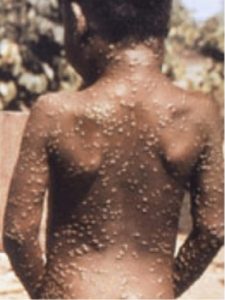
The Nigeria Centre for Disease Control and Prevention (NCDC), has raised the alert level for all port health services across the country, including international airports, seaports, and land borders, in response to ongoing mpox outbreaks in Africa.
This heightened alert was announced by NCDC Director-General, Dr. Jide Idris, during a press briefing in Abuja, following the declaration of mpox as a public health emergency by the World Health Organization (WHO) and the Africa Centres for Disease Control and Prevention (Africa CDC).
Dr. Idris, also mentioned that certain states, including Lagos, Abuja, Enugu, Kano, Rivers, Cross River, Akwa Ibom, Adamawa, and Taraba, have been placed on high alert due to previously detected mpox cases.
He reported that 39 cases have been confirmed across 33 states, including the Federal Capital Territory (FCT), with no recorded deaths.
Dr. Idris assured that efforts are underway to secure vaccines for the country.”Bayelsa (5), Cross River (5), Ogun (4), Lagos (4), Ondo (3), and Ebonyi (3) are currently leading in the number of reported cases”.

“Given the significant concern over the ease of cross-border transmission, this press conference is part of our effort to enhance coordination and communication with stakeholders to manage the spread of the virus and prevent further importation of the disease,” Dr. Idris stated.
Providing an update on the cholera outbreak, the NCDC Director-General reported that as of August 11, 2024, 5,951 suspected cases and 176 deaths have been recorded across all 36 states and the FCT.
“The trend of suspected cholera cases is expected to fluctuate and may persist until Epidemic Week 37, in line with patterns observed in cholera outbreaks in Nigeria from 2020 to 2024. Current rainfall forecasts indicate a potential increase in the number of cases,” Dr. Idris said.
He explained that factors such as open defecation and contaminated water sources, exacerbated by the rainy season, are contributing to the spread of the disease.
Dr. Idris also highlighted that the NCDC has developed a disease calendar to predict and prepare for future outbreaks.
He noted that Lassa fever cases are expected to rise slightly in October and November, peak between December and February, and decline by March and April.
Regarding yellow fever, Dr. Idris mentioned that cases are expected to peak in November and begin to decline in December.










